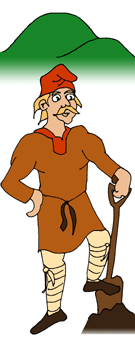|
RBH Home
Maps & Travels
Articles
Legends
Towns & Villages
Castles & Houses
Churches
Biographies
Gentry
Family History
Odds & Ends
For Kids
Teacher's Page
Mail David

|
|

in Saxon Berkshire

|
- Early Saxon
people buried most
of their dead in graves in cemeteries. However, they also liked to
bury them in burial mounds.
- Most of the bodies buried in
mounds seem to have been those of important people. These might have
been soldiers, chiefs or kings. A few queens or princesses have also
been found.
- They would be buried with lots
of things to take with them to the afterlife.
- Sometimes the Saxons would use a
prehistoric burial mound (called a 'barrow') which was already there.
Several people could be buried in them, like at Burghfield or Lambourn.
- They were seen as magical. The
Saxons even thought the smith-god, Wayland,
lived at the long barrow called 'Wayland's
Smithy'.
- Very important Saxon people had a
single mound all to themselves. The most famous ones are the Sutton
Hoo mounds in Suffolk. The Kings of East Anglia were buried in them.
They contained lots of gold and other expensive things.
- Another gold-filled Saxon mound
was dug up at Taplow (in Buckinghamshire), near
Maidenhead. The man
buried there may have been a King of Sunningum in East Berkshire.
- The best burial mound from Saxon
Berkshire is on Lowbury Hill, on the border between Aston Upthorpe and
Aldworth.
- There are or were once other
important Saxon mounds in the region too:
- A flattened mound near Uffington
Castle was called the Dude Barrow. Didan is supposed to have been a
sub-King of Wessex or
Mercia. He was the father of St. Frideswide.
The mound contained a Saxon burial that might have been his.
- Challow, near Wantage, means
'Ceawlin's Barrow'. He was a King of Wessex.
- Cuckhamsley Barrow (also
called Scutchamer's Knob) stands on the Ridgeway at East Hendred.
The name means ' Cwichelm's Barrow'. It is an Iron Age mound but may be the burial place of King
Cwichelm of Wessex. A Victorian excavation didn't find anything
there,
but the Victorians were very bad at Archaeology!
- The burial of a Saxon
soldier and his horse was found at Reading in Victorian times. We
don't know much about it. It might have been under a mound. It
might have been like the the burial under Mound 17 at Sutton Hoo.
But some people think it was a Viking
burial from later times.
|
|



